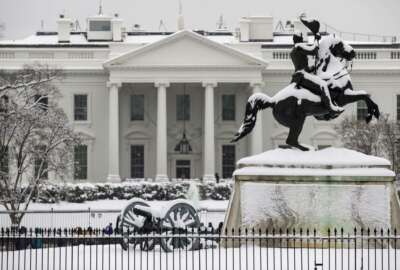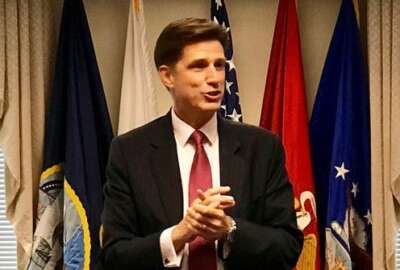
Plan to give civilian federal employees pay raise gets more Congressional support
In today's Federal Newscast, Senate Democrats have brought forth a companion to a new bill from House Democratic leaders, which calls for giving civilian federal...
To listen to the Federal Newscast on your phone or mobile device, subscribe on PodcastOne or Apple Podcasts. The best listening experience on desktop can be found using Chrome, Firefox or Safari.
- Momentum is building to give federal employees a pay raise in 2019. Senate democrats have brought forth a companion to a new bill from House Democratic leaders. The legislation would give civilian federal employees the same 2.6 percent raise as military members. It would retroactively apply for civilian employees as of Jan. 1. The House is expected to vote on the pay raise bill on Jan. 30. Some House Republicans object to the bill because of the speed at which it’s moving through Congress. Maryland and Virginia Sens. Chris Van Hollen (D-Md.), Ben Cardin (D-Md.), Tim Kaine (D-Va.) and Mark Warner (D-Va.) introduced the Senate version. (Sen. Chris Van Hollen)
- The Office of Personnel Management directed federal employees in the D.C. metro area to report to work three hours later than normal on Jan. 3 due to inclement weather. Employees have the option of unscheduled leave or unscheduled telework. Snow showers impacted much of the national capital region Tuesday evening. (Federal News Network)
- Due to the cold in the northwest, the Postal Service is suspending deliveries today. States affected include Minnesota, North and South Dakota, Iowa, along with Western Wisconsin and Western Illinois. Retail operations at local offices will be available, but may be limited. There will be no pick up services from businesses or homes either. (U.S. Postal Service)
- Michael Kubayanda is sworn in as the newest commissioner on the Postal Regulatory Commission. The agency now has a full leadership board of five commissioners. Prior to joining the PRC, Kubayanda served as the director of government relations at the Postal Service’s Office of Inspector General. He’ll serve out the remainder of a six-year term that expires in November 2020. (Postal Regulatory Commission)
- There’s bipartisan interest from Congress in creating new financial flexibilities for federal employees who face hardship during future government shutdowns. Several lawmakers introduced new bills to allow federal employees of all ages to tap into their Thrift Savings Plan without penalty. The Federal Retirement Thrift Investment Board said there’s an opportunity to expand regulations that typically help federal employees take hardship loans during natural disasters, to employees who need help during future shutdowns. (Federal News Network)
- For a third year in a row, President Donald Trump’s annual budget request will be late. A senior OMB official told Federal News Network that it will not be transmitting the President’s budget to Congress next week. The official said OMB is working on a revised schedule and will provide additional information when it’s available. OMB sent the President’s 2018 request in May 2017 and the 2019 request in mid-February 2018. Current federal law requires the president to submit his budget to Congress on or before the first Monday in February.
- The Chairman and Ranking Member of the House Armed Services Committee are taking a stand against using defense funds to build a wall on the southern border. Chairman Adam Smith (D-Wash.) and Ranking Member Mac Thornberry (R-Texas) said using defense money to build the wall would divert money from military readiness. The remarks were made during a committee hearing on Jan. 29. If the President declares a national emergency, he would have access to military construction funds for the purpose of a wall.
- The Government Accountability Office plans to hire new staff, and reorganize current employees, to meet a growing demand for technology oversight. GAO launched its Science, Technology Assessment and Analytics team. It will include an audit innovation lab to test advanced analytics tools and assess emerging technologies, such as artificial intelligence and blockchain. (Government Accountability Office)
- HHS employees who travel overseas have new security requirements. Employees at the Department of Health and Human Services now have to take a loaner laptop or smartphone when they travel anywhere overseas. A new policy from the acting chief information security officer mandates the change. Previously, HHS’s policy required employees take loaner devices only to certain countries that were deemed unfriendly. But too often, acting CISO Janet Vogel said, laptops would come back infected with malware even from friendly countries. Vogel said because cyber attacks know no boundaries, HHS is acting with extra caution when it comes to employees who travel with technology devices. (Federal News Network)
- The Defense Department is looking at new ways to shore up its smaller vendors’ cybersecurity. A DoD task force will take an end-to-end look at the department’s contractual relationships with an eye toward preventing data breaches. Among the options: Conducting spot checks of some of DoD’s subcontractors to test whether they’re complying with existing security rules, or certifying third-party companies to do the same. DoD CIO Dana Deasy said the department is increasingly viewing contractors’ IT systems as an extension of its own network. (Federal News Network)
- The Defense Department knows who it wants to lead the new U.S. Space Command, the only question is when acting Defense Secretary Patrick Shanahan will announce it. Shanahan said DoD is not yet ready to go forward with the nomination process. President Trump signed the order to create Space Command last December. The command is a possible precursor to the space force. (Department of Defense)
- Online healthcare applications from veterans are up 50 percent this year compared to previous years. The Veterans Affairs Department said the agency’s relaunch of VA.gov contributed to the increase in online interest. VA is also finalizing its plans to adopt and move some of its 900 existing applications to an enterprise cloud. The goal is to move 350 applications to the VA’s enterprise cloud by 2024.
- The Veterans Affairs inspector general discovered practices at one VA clinic that would drive up anyone’s blood pressure. Staff at the Salem, Virginia facility falsified blood pressure readings. For hundreds of patients, they entered the exact same second measure, 139 over 89. That’s one point below the trigger for additional treatment. Staff told investigators they forgot the second reading before writing it down. Several dozen hypersensitive patients were put at risk for stroke or heart attack. The outpatient clinic is operated by Valor Healthcare. (Department of Veterans Affairs Office of Inspector General)
Copyright © 2025 Federal News Network. All rights reserved. This website is not intended for users located within the European Economic Area.
Eric White
Eric White is news anchor and Federal Drive producer at Federal News Network.
Follow @FEDERALNEWSCAST
Related Stories
Related Topics
Adam Smith
Agency Oversight
All News
Artificial Intelligence
Ben Cardin
border wall
Budget
Chris Van Hollen
Cloud Computing
Congress
Cybersecurity
Dana Deasy
Data Breach
Defense
Defense Department
Defense News
Department of Health and Human Services
Donald Trump
Federal Drive
Federal Newscast
federal pay raise
Federal Retirement Thrift Investment Board
Government Accountability Office
Government Shutdown
IT Modernization
Janet Vogel
Mac Thornberry
Management
Mark Warner
Michael Kubayanda
Office of Management and Budget
Pay
Pay & Benefits
Postal Regulatory Commission
Postal Service
Space Command
Technology
Tim Kaine
TSP
Veterans Affairs
Workforce





